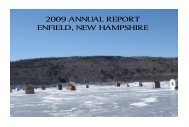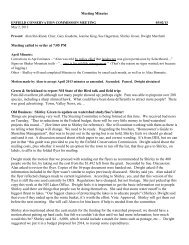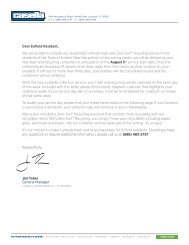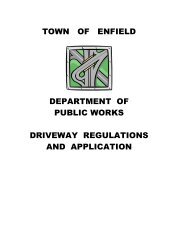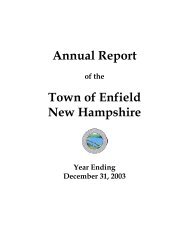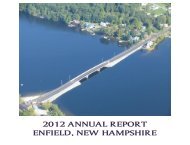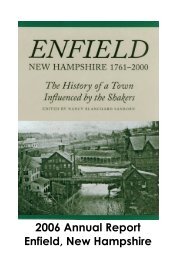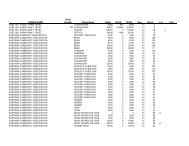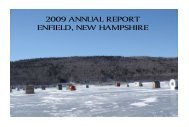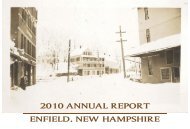2010 ANNUAL REPORT ENFIELD, NEW ... - Town of Enfield
2010 ANNUAL REPORT ENFIELD, NEW ... - Town of Enfield
2010 ANNUAL REPORT ENFIELD, NEW ... - Town of Enfield
Create successful ePaper yourself
Turn your PDF publications into a flip-book with our unique Google optimized e-Paper software.
Right to Know Law<br />
~ A Guide to Public Access ~<br />
1. What is the “Right to Know” Law RSA 91-A?<br />
It is New Hampshire’s Statute, which emphasizes that the business <strong>of</strong><br />
the <strong>Town</strong> is the public’s business. It makes it clear that with very few<br />
exceptions, the public has access to <strong>Town</strong> records and meetings held in<br />
connection with <strong>Town</strong> Government.<br />
2. Who does it cover?<br />
All <strong>of</strong> us, whether we are elected <strong>of</strong>ficials, employees, or volunteers<br />
serving on a Board <strong>of</strong> the <strong>Town</strong> <strong>of</strong> <strong>Enfield</strong>.<br />
3. What does it cover?<br />
It covers all “meetings”. A meeting occurs whenever a quorum <strong>of</strong> a<br />
Board, Committee or Subcommittee gathers and discusses or acts upon a matter<br />
over which that Board, Committee, or Subcommittee has supervision, control,<br />
jurisdiction, or advisory power. The law also requires that the business <strong>of</strong> a<br />
Board be conducted at a meeting, rather than by telephone, E-mail, or private<br />
gathering <strong>of</strong> individuals. New legislation allows telephone participation at a<br />
meeting.<br />
Boards may allow one or more members to participate by telephone or<br />
other electronic means if (1) physical attendance is not reasonably practical (note<br />
in minutes); (2) all members can simultaneously hear and speak with each other;<br />
(3) except in an emergency, a quorum is still physically present in the location<br />
where the public was told the meeting would occur; and (4) all parts <strong>of</strong> the<br />
meeting are audible or otherwise discernable to the public in that location. (1)<br />
Legal meetings may never be conducted by email or any other format,<br />
which does not allow the public to hear, read or discern the discussion<br />
contemporaneously at the meeting location. (2)<br />
Public bodies may only deliberate in properly hold meetings, and may<br />
not use communication outside a meeting (such as sequential emails or phone<br />
calls) to circumvent the spirit or the purpose <strong>of</strong> the law. (3)<br />
4. If it is a meeting, what does that mean?<br />
A notice <strong>of</strong> the time and place <strong>of</strong> the meeting must be posted at least 24<br />
hours in advance (excluding Sundays and legal holidays) in at least 2 public<br />
places. As <strong>of</strong> July 1, 2008, the <strong>Town</strong>’s web site may now be counted as one <strong>of</strong><br />
the two public posting locations.<br />
241



